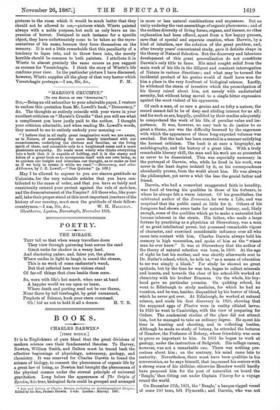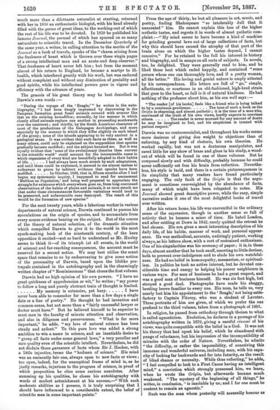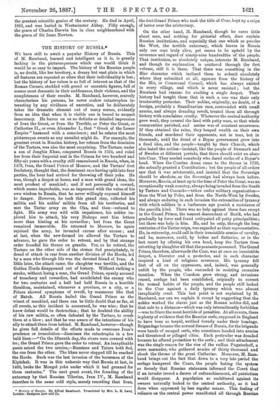BOOKS.
CHARLES DARWIN.* [FIRST NOTICE.]
IT is to Englishmen of pure blood that the great divisions of modern science owe their fundamental theories. To. Harvey, Newton, William Smith, and Dalton must be traced back the effective beginnings of physiology, astronomy, geology, and chemistry. It was reserved for Charles Darwin to found the science of biology, to connect the phenomena of organic life by a great law of being, as Newton had brought the phenomena of the physical cosmos under, the eternal principle of universal gravitation. Long before the appearance of The Origin of Species, it is true, biological facts could be grouped and arranged
•
Fsofa C.1■1371es Darrg,ln.clualann: Aiutobioygraphical Chapter. in more or less natural combinations and sequences. But no unity underlay the vast assemblage of organic phenomena ; and of the endless diversity of living forms, organs, and tissues, no other explanation had been offered, apart from a few happy guesses, save that of special and separate creation, when Darwin, by a kind of intuition, saw the solution of the great problem, and, after twenty years' concentrated study, gave it definite shape in the theory of Natural Selection. But the discovery and laborious development of this great generalisation do not constitute Darwin's only title to fame. His mind sought relief from the main work of his life in the diligent and constant interrogation of Nature in various directions ; and what may be termed the incidental product of his genius would of itself have won for him a place in the very forefront of biological science. Lastly, he withstood the storm of invective which the promulgation of his theory raised about him, not merely with undisturbed serenity, but without being moved to a single bitter expression against the most violent of his opponents.
Of such a man, of so rare a genius and no lofty a nature, the record cannot fail to be of deep and abiding interest for ne all and for such as are, happily, qualified by their studies adequately to comprehend the work of his life, of peculiar value and im- portance. It was, however, no easy task to do justice to so great a theme, nor was the difficulty lessened by the eagerness with which the appearance of these long-expected volumes was awaited. But the task has been executed in a manner satisfying the keenest criticism. The book is at once a biography, an autobiography, and the history of a great idea. With a truly remarkable literary skill, the man and his work are so presented as never to be dissociated. This was especially necessary in the portrayal of Darwin, who, while he lived in his work, was never in the least degree isolated by it, as his correspondence abundantly proves, from the world about him. He was always the philosopher, yet never a whit the less the genial father and friend.
Darwin, who had a somewhat exaggerated faith in heredity, was fond of tracing his qualities in those of his forbears, in whom he always felt a warm interest. Of his grandfather, the celebrated author of the Zoonomia, he wrote a Life, and was surprised that the public cared so little for it. Others of his foregoers bad shown some taste for natural history, and, likely enough, some of the qualities which go to make a naturalist had become inherent in the strain. His father, who made a large fortune by practising as a physician at Shrewsbury, was a man of no great intellectual power, but possessed remarkable vigour of character, and exercised considerable influence over all who came into contact with him. Charles Darwin always held his memory in high veneration, and spoke of him as the " wisest man he ever knew." It was at Shrewsbury that the author of the theory of natural selection was born, in 1809. At the age of eight he lost his mother, and was shortly afterwards sent to Dr. Butler's school, which, he tells us, " as a means of education to me was simply a blank." For study he showed no great aptitude, but by the time he was ten, began,to collect minerals and insects, and towards the close of his school-life worked at chemistry with his brother Erasmus. On the whole, his boy- hood gave no particular promise. On quitting school, he went to Edinburgh to study medicine, for which be had no vocation, and he was, besides, disqualified by his horror of blood, which he never got over. At Edinburgh, he worked at natural science, and made his first discovery in 1826, showing that the supposed eggs of Flustra were in reality ciliated larval. In 1828 he went to Cambridge, with the view of preparing for Orders. The academical studies of the place did not attract him, but he managed to take an ordinary degree. He spent his time in hunting and shooting, and in collecting beetles. Although he made no study of botany, he attended the lectures of Henelow, the Professor of Botany, whose friendship was soon to prove so important to him. In 1831 he began to work at geology, under the instruction of Sedgwick. His college career, however, was not a remarkable one. There was nothing pre- cocious about him ; on the contrary, his mind came late to maturity. Nevertheless, there must have been qualities in his conversation, as he says himself, that impressed his seniors with a strong sense of his abilities, otherwise Henslow would hardly have proposed him for the post of naturalist on board the 'Beagle,' then fitting out under Captain Fitzroy for a voyage round the world.
On December 27th, 1831, the ' Beagle,' a barque-rigged vessel of some 240 tom, left Plymouth; and Darwin, who was•not
much more than a dilettante naturalist at starting, returned with her in 1836 an enthusiastic biologist, with his head already filled with the germs of great ideas, to the working-out of which the rest of his life was to be devoted. In 1839 he published his famous Journal, the perusal of which has spurred on so many naturalists to scientific travel. In the December Quarterly of the same year, a writer, in calling attention to the merits of the Journal as a book of travels, speaks of the " charm arising from the freshness of heart which is thrown over these virgin pages of a strong intellectual man and an acute and deep observer."
That freshness of heart never left him ; but from the moment almost of his return to England, he became a martyr to health, which interfered greatly with his work, but was endured without complaint and without any diminution of geniality and good spirits, while his intellectual powers grew in vigour and efficiency with the advance of years.
The genesis of his great theory may be best described in Darwin's own words :-
"During the voyage of the ' Beagle,'" he writes in the auto- biography, "I had been deeply impressed by discovering in the Pampean formation great fossil animals covered with armour like that on the existing armadillos ; secondly, by the manner in which closely allied animals replace one another in proceeding southwards over the continent ; and thirdly, by the South American character of moat of the productions of the Galapagos Archipelago, and more especially by the manner in which they differ slightly on each island of the group ; none of the islands appearing to be very ancient in a geological sense. It was evident that such facts as these, as well as many others, could only be explained on the supposition that species gradually became modified ; and the subject haunted me. But it was equally evident that none of the evolutionary theories then current in the scientific world' could account for the innumerable oases in which organisms of every kind are beautifully adapted to their habits
of life I had always been much struck by such adaptations, and until these could be explained, it seemed to me almost useless to endeavour to prove by indirect evidence that species have been
modified In October, 1838, that is, fifteen months after I had begun my systematic inquiry, I happened to read for amusement
• Malthus on Popalation,' and being well prepared to appreciate the struggle for existence which everywhere goes on, from long-continued observations of the habits of plants and animals, it at once struck me that under these circumstances favourable variations would tend to be preserved, and unfavourable ones destroyed. The result of this would be the formation of new species."
For the next twenty years, while a laborious worker in various departments of natural science, Darwin continued to pursue his speculations on the origin of species, and to accumulate from every source evidence bearing on the subject. But of the course of the theory of natural selection, of the dramatic situation which compelled Darwin to give it to the world in the most epoch-making book of the nineteenth century, of the keen opposition it excited—not so hard to understand as Mr. Huxley seems to think it—of its triumph (at all events, in the world of science) and far-reaching consequences, the account must be reserved for a second notice. We may best utilise the scant space that remains to us by endeavouring to give some notion of the personality of Darwin, based upon the lifelike por- trayals contained in the autobiography and in the charmingly written chapter of " Reminiscences " that closes the first volume.
Darwin had no high opinion of his own powers. "I have no great quickness of apprehension or wit," he writes ; " my power to follow a long and purely abstract train of thought is limited.
My memory is extensive, yet hazy I have never been able to remember for more than a few days a single date or a line of poetry." He thought he had invention and common-sense, but not more than a "fairly successful lawyer or doctor must have." But he believed himself to be superior to most men in the faculty of minute attention and observation, and also in diligence and perseverance. " What is far more important," he adds, "my love of natural science has been steady and ardent." To this pure love was added a strong ambition to win a name in science, and an insatiable desire to " group all facts under some general laws," a very peculiar and rare quality even of the scientific intellect. Nevertheless, he did not disdain those garnerers of facts whom Sir J. Hooker, with a little injustice, terms the " hodmen of science." His mind was an eminently fair one, always open to new facts or views ; too open, indeed, for the unsceptical frame of mind is, as he justly remarks, injurious to the progress of science, in proof of which proposition he cites some curious anecdotes. After summing up his qualities, he closes his autobiography with words of modest astonishment at his success,—" With such moderate abilities as I possess, it is truly surprising that I should have influenced to a considerable extent, the belief of scientific men in some important pointe." From the age of thirty, he lost all pleasure in art, music, and poetry, finding Shakespeare "so intolerably dull that it. nauseated" him. He cannot explain this loss of the higher reethetic tastes, and regrets it in words of almost pathetic com- plaint :—" My mind seems to have become a kind of machine for grinding general laws out of large collections of facts, but why this should have caused the atrophy of that part of the brain alone on which the higher tastes depend, I cannot. conceive." For he retained to the full his interest in history and biography, and in essays on all sorts of subjects. In novels, too, he delighted. They were generally read to him, and he liked those best which ended happily, and contained "some person whom one can thoroughly love, and if a pretty woman, all the better." His loving and genial nature is amply attested by his correspondence. His letters are full of "go," simple, affectionate, or courteous in an old-fashioned, high-bred strain that goes to the heart, so full is it of natural kindness. He had nothing of the professor about him, as his son well says :— " The reader [of his books] feels like a friend who is being talked to by a courteous gentleman The tone of such a book as the Origin is charming, and almost pathetic ; it is the tone of a man who, convinced of the truth of his own views, hardly expects to convince
others The reader is never scorned for any amount of doubt he may be imagined to feel, and his scepticism is treated with patient respect."
Darwin was no controversialist, and throughout his works seems more desirous of giving due weight to objections than of, enforcing, by any kind of rhetoric, his own theories. He• worked rapidly, but was not a dexterous manipulator, and cared little for any show of brass and glass in his study, a wood- cut of which will be found in one of these volumes. But he composed slowly and with difficulty, probably because he could never sufficiently set free his brain from reflection. Neverthe- less, his style is lucid, and there is a certain picturesqueness in its simplicity that many readers have found particularly engaging. The only fault of the Origin is that the argu- ment is sometimes overweighted by the abundance of facts, many of which might have been relegated to notes. His Journal showed great descriptive power, while the easy, simple narrative makes it one of the moat delightful books of travel ever written.
After his return home, his life was uneventful in the ordinary sense of the expression, though in another sense so full of activity that he became a miser of time. He hated London, and after settling at Down in 1842, rarely quitted the retreat he had chosen. His son gives a most interesting description of his daily life, of his habits, manner of work, and personal appear- ance. He was methodical, accurate, untiringly patient, working always, as his letters show, with a sort of restrained enthusiasm. One of his singularities was his economy of paper; it is, in these days, almost another that he took snuff, resorting to little devices, both to prevent over-indulgence and to elude his own watchful- ness. He had no belief in homoeopathy, mesmerism, or spiritual- ism. In politics he took no active interest, but he devoted con- siderable time and energy to helping his poorer neighbours in various ways. For men of business he had a great respect, and was a good man of business himself. He was six feet high, but stooped a good deal. Photographs have made his shaggy, beetling brows familiar to every one. His nose, he tells us, very nearly lost him his appointment to the Beagle,' not being satis- factory to Captain Fitzroy, who was a student of Lavater. Three portraits of him are given, of which we prefer the one prefixed to the third volume, taken from a photograph of 1881.
In religion, he passed from orthodoxy through theism to what is called agnosticism. Evolution, he declares in a passage of his autobiography written in 1876, giving a careful resume of his views, was quite compatible with the belief in a God. It was not his theory that had upset his belief, which he abandoned with pangs of reluctance, but his impression of the incompatibility of miracles with the order of Nature. Nevertheless, he admits "the difficulty, or rather the impossibility, of conceiving this immense and wonderful universe, including man, with his capa- city of looking far backwards and far into futurity, as the result, of blind chance or necessity. While thus reflecting," he adds, " I feel compelled to look to a First Cause having an intelligent mind," a conviction which strongly possessed him, we learn, when he wrote the Origin, but afterwards became much weakened. "The mystery of the beginning of all things," he writes, in conclusion, "is insoluble by us; and I for one must be content to remain an agnostic."
Such was the man whom posterity will assuredly honour as the greatest scientific genius of the century. He died in April, 1882, and was buried in Westminster Abbey. Fitly enough, the grave of Charles Darwin lies in close neighbourhood with the grave of Sir Isaac Newton.












































 Previous page
Previous page